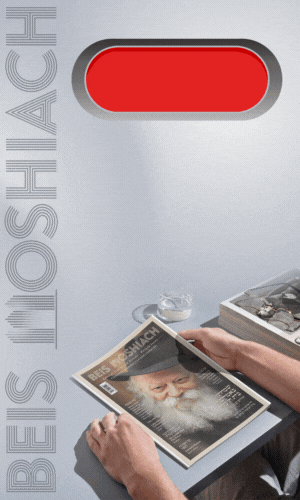A Farbrengen in the Rov׳s Home
During Rav Aharon Yaakov Schwei’s last Tishrei in this world, Rabbi Nachman Lerner brought a group of bochurim from Tomchei Tmimim in Beit Shemesh to Harav Shwei’s house for a farbrengen. Here are some recollection of those sweet moments Rabbi Lerner recorded after the Rov’s passing • Presented in honor of his third yahrzeit on Rosh Chodesh Iyar • By Beis Moshiach Magazine • Full Article
Rav Yisroel Nachman Lerner, Beis Moshiach
A foundational element in ways of Chassidim and their practices is to observe and glean from the behavior, ways and stories of the elder Chassidim. As the Rebbe Rayatz says in Likutei Dibburim, “An elder Chassid feels it it his holy obligation to be immersed in benefiting the chinuch of a young man.”
With this in mind, we rabbis and students of Yeshiva Gedola Lubavitch of Beit Shemesh, who came to spend Tishrei with the Rebbe last year, walked over on Friday night, 12 Tishrei 5780, to the home of the Mara d’Asra of Crown Heights, Rabbi Aharon Yaakov Schwei a’h.
In all honesty, few of those who walked among us are deserving of the lofty titles of ChaYaL (Chassid, yerei shamayim, lamdan). At the same time, nobody can dispute the fact that Rabbi Schwei bore those titles and actualized them fully, in every step of his life.
This unusual farbrengen, that we had in the living room of Rabbi Schwei’s modest home, presented and exposed to these young tmimim, perhaps for the first time in their lives, the full picture: Chassid, yerei shomayim and a lamdan who served as a Chassidishe rav in the place of residence of the Rebbe MH”M.
In the conversation that I had with some talmidim since we learned of R’ Schwei’s passing, it became clear that the direct encounter with him and the memories of a life of mesirus nefesh that he spoke about, had made a deep impression on them.
With gratitude to R’ Schwei, who showed such generosity of spirit to us and at the height of an exhausting busy season of Tishrei, between Yom Kippur and Succos devoted of his time and energy to farbreng with us and bestow us with a precious Chassidic treasure. I will attempt here to share some of the pearls that he shared with us.
THE DIFFERENCE IN LEARNING BETWEEN A CHASSID AND A MISNAGED
“Fortunate are you that you came to the Rebbe. Fortunate are you that you have a Chassidishe yeshiva and a Chassidishe rosh yeshiva,” he began warmly, “I was once traveling in Yerushalayim and a Chassidishe, though not Lubavitcher, yungerman sat next to me. He asked, ‘Are you a Lubavitcher Chassid?’ When I said yes, he said he had a story for me.
“He was once at a farbrengen with Chassidim and he saw two Chassidim sitting together. He heard one say to the other, ‘Why did you take your son out of Ponovezh and bring him to Tomchei Tmimim? What difference is there between the yeshivos? Here they learn about Abaya, Rava, Rebi Yehuda and Rebi Meir and there they learn about them too. It’s the same thing so why did you take him out of Ponovezh?’
“The other one said it wasn’t because of the learning but because of the ‘devarim b’teilim’ that the bachurim spoke about during breaks etc. He wanted his son’s devarim b’teilim to be that of Lubavitcher Chassidim and not of Ponovezher bachurim.”
This anecdote is a familiar one that often comes up at farbrengens, but R’ Schwei was clearly not pleased with the message: “Actually, he is incorrect. Why? Because the difference between Ponovezh and Tomchei Tmimim is not just in the casual conversation; the learning is altogether different! When you learn a daf Gemara in a Chassidishe yeshiva and discuss a dispute between Tannaim and Amoraim, you are not dealing with the reasoning of a sage such as Abaya and Rava but you know this is the word of G-d! Because someone who learns Chassidus knows that it is all the word of G-d!”
As an example, he described the following, “There was a Chassid who, when he learned, would read the Gemara, ‘Omar Abaya …’ and would translate it, ‘Zogt der Aibershter’ (G-d says), because in order to learn and understand the holy Torah according to the supernal intent, one needs to remember and know at every moment that this is G-d speaking!
“If so, how is it that we often find arguments in the Mishna and Gemara between Beis Shammai and Beis Hillel, between Rebi Yishmael and Rebi Akiva?” Here, R’ Schwei repeated what it says in many places in Chassidus that there are differences due to the sources of the neshamos of the Tannaim and Amoraim and this influenced their way of thinking on how to rule in halacha, but “these and these are the words of the living G-d!”
A TRUE CHASSIDISHE LAMDAN
As a Chassidishe mechanech to whom the concept of a “Chassidishe lamdan (scholar)” was particularly dear, R’ Schwei set out to infuse us with the excitement of “Chassidishe lamdanim,” as he explained why a tamim is a true lamdan:
“Lamdonus (scholarship) of Lubavitcher Chassidim is not like smart people who learn and debate among themselves in intellectual matters. Rather, lamdonus is only about knowledge of Hashem and Toras Hashem and this is an altogether different lamdonus.”
It was apparent that R’ Schwei was happy at the opportunity to convey to the tmimim the proper Chassidishe way of learning along with the need to behave in a way of ‘and his heart was lifted up in the ways of Hashem.’ As Chazal say, a Torah scholar needs to have a bit of pride, ‘an eighth of an eighth.’ And he also provided practical advice for success in learning:
“I once spoke with talmidim and told them that I heard that the Chasam Sofer was very successful in his learning and he said that this was because he put himself into his learning in such a way that he saw himself as one of the protagonists in the case being discussed in the sugya.
“When you learn something, for example, when you learn ‘two who grasp a tallis’ – it’s not enough to learn it in the usual way but to consider yourself as the owner of the tallis who claims ‘it is all mine,’ for then you understand the Mishna or Gemara better. Also with ‘an ox that gored a cow’ – although you don’t have to think you’re a cow, you are the owner who needs to pay for the damages that your cow caused! When you are the owner, you understand the sides and claims better.
“It says in maamarim that when the matter affects you, you understand it better such as the fact that Tannaim and Amoraim analyze and dissect the claims of a woman. One might ask how does this woman know all the ins and outs of the Gemara with all the reasoning and distinctions involved? Says the Rebbe Maharash, when something affects you, it becomes yours and you understand it well.”
He mentioned the Chassidishe mashal of the villager who couldn’t read and when he got a letter he asked the melamed who taught his children to read it for him. When the man read that the father of the villager died, the villager fainted. Chassidim ask, what is the difference between the melamed and the villager? Why did the villager faint when he merely heard what was written while the melamed, who read the letter himself, did not faint?
Since the letter was not about the melamed’s father, but the villagers’ father, it was the villager who fainted because it was his father! The same is true when we learn Nigleh and Chassidus. We need to put ourselves into a state where it affects us! Must he pay or does he not need to pay? Who? Me! It’s happening with me and I am responsible for it. We understand this better and remember it better and then there is greater success in learning.
Just as this is true in Nigleh, it’s the same with Chassidus. One can ask: I learned a lot of maamarim and hemshechim but I don’t find myself in what I learn. Where am I in this?
“When you know that everything written means me – I have in me a part of G-d above literally, I can connect to G-d, then it has a much greater effect.”
I have to say that I recall how this unique quality of R’ Schwei really stood out for me at the time. It’s not easy to lead a community, to be involved in halachic analysis and issuing a psak, and at the same time to live with truth and with uplifting sincerity the way that a Chassid approaches learning with a desire to reveal the word of G-d that lights up every word of Torah.
MESIRUS NEFESH FOR TORAH STUDY
Between a warm niggun and saying l’chaim, R’ Schwei told us a little about his difficult life, which over time was woven into an entire tapestry of a life suffused with Chassidishkeit and hiskashrus to the Rebbe along with self-sacrifice for Torah study and the fulfillment of mitzvos, descriptions that made an everlasting impression on his listeners.
First, he spoke about his father, Rabbi Mordechai Eliyahu, a descendant of Rashi who, after finishing his studies in Tomchei Tmimim, did shimush for rabbanus by the Rogotchover in Dvinsk. After he married he moved to Finland on shlichus for the Rebbe Rayatz.
“I was born in Finland (1934) and my memories from there are that of a very young child. Afterward, we moved to Estonia, a country near Petersburg, also on shlichus for the Rebbe Rayatz.
“Jews regularly came to our home and were helped by my father who was a rav and they asked him questions. Engraved in my memory is a childhood image of my father sitting for hours and learning from a very big ‘siddur.’ It was probably a Gemara but as a little boy I thought it was a siddur.
“I also remember that one time my father went to see the Rebbe Rayatz. When he returned, he brought a maamar Chassidus with him which he sat down to learn with my older brothers, Boruch Sholom and Aizik. I was very jealous. ‘Why can’t I join them in learning with my father?’
“In Estonia, life was materially better until the war broke out. Our city was on the coast (of the Baltic Sea) and there were many factories and industrial sites and during the war the Russians and Germans fought over this city. A law was made that every family had to volunteer one person to go outside the city for two weeks and dig trenches around the city to block the Germans’ tanks in the event they would come. It was very dangerous because the Germans would bomb the entire area of the trenches from the air.
“In my family, my mother (Bunia, who was a descendant of an original Chassidic family from the days of the Alter Rebbe) decided and informed my father that he would not be going to dig trenches. She would! Why? She said that if my father went and G-d forbid did not return, she would not know how to teach us Torah in his place and she refused to allow us to be left without a way of continuing to learn Torah.”
As we listened, could sense that R’ Schwei’s entire life of mesirus nefesh as a teacher, rav, posek, a person with endless Ahavas Yisrael, was something he absorbed in his childhood when he saw what his mother did, choosing to go to a dangerous place to preserve her children’s chinuch. After two weeks of hard labor, she miraculously returned in good health.
ESCAPING TO BUKHARA
The line “What do you remember?” accompanied the Rebbe Rayatz in his youth when his father would constantly encourage him to conjure up his childhood memories of the Rebbe Maharash since memory is a cornerstone in the chinuch of a Chassid.
When R’ Schwei describes his childhood memories of the war, it was like having an artist paint a picture before your eyes of what is the mesirus nefesh of Chassidim. It is very hard, in writing, to convey the sense and feeling that accompanied his words.
“Many fled from Estonia because of the war. We got out on the last train which traveled eastward toward Uzbekistan. Although we really wanted to get out in Samarkand or Tashkent because we knew that many Chassidim were there, the government did not allow us to get off the train. This was because there were already too many refugees there. Having no choice, we traveled on until we arrived in the city of Bukhara in Uzbekistan.
“Shortly after we arrived, my father passed away, in Shevat 5702/1942. We were alone with my mother who constantly sought out every way to provide and enable us to continue learning Torah. There was no yeshiva in Bukhara but there was the gaon of Tchebin, Rabbi Dov Berish Weidenfeld (1881-1965) who had just taken Rabbi Boruch Shimon Schneerson (later served as rosh yeshiva in Tomchei Tmimim in Kfar Chabad) as his son-in-law.
“I was at a wedding and saw him. My mother took the opportunity and went over and asked him to teach us Torah. When he said no, she pleaded with him to at least learn with her oldest son, Boruch Sholom.”
He continued to refuse, saying, “I am not a melamed.” Indeed, R’ Schwei noted that it really was beneath him to teach children.. This was meant to deter her from continuing to insist that he teach her son but she did not give up and begged him.
In addition, there was a Chassid who said to the gaon, “Leave that odd woman …” but as R’ Schwei put it, “My mother gave it to him over the head with all her heart …”
In the end, the gaon agreed to learn with his brother, Boruch Sholom. With time, the gaon even enjoyed learning with him and loved him deeply since he was an exceptionally gifted child.
“After a while, my mother met R’ Eliezer Mishulovin on the street and she asked him whether he knew where children could learn. When he said that there was a yeshiva in Samarkand, she asked him to take her children with him, but he didn’t want to because if they caught him on the train bringing a child without proper documentation they would put him in jail.
“My mother pleaded and said ‘The child won’t say that you are taking him, just that he is traveling alone and you are merely supervising him.’ He finally agreed. On the first trip he took Boruch Sholom. Then he took Aizik, the same way, and when it was my turn, I refused. I was afraid to travel without my mother [he wasn’t even ten] to an unfamiliar place … The truth is that even my mother was unfamiliar with it but she promised me that she would come too and with that promise I agreed to go.”
He described in detail the famous story of his waiting for his mother in the train station and with a sheepish smile he said, “And they made an entire story out of it. We need to trust and believe in the coming of Moshiach since Hashem promised, the Rebbe promised, and we just need to go and wait …”
We then heard with an impossible to describe sweetness how R’ Eliezer Mishulovin took him to Samarkand. “He put me among the crates in the train and boruch Hashem they did not catch me. In his great fear he warned me that if they asked me who I was traveling with, I should absolutely not say that he was taking me with him. I was to say I was traveling on my own.
“Then my mother had to go to the NKVD because they asked her where her children are. She told them, ‘You know that lately, children are running away from their parents and they also ran away and I don’t know where they are! They ran away from me …’”
VIBRANT CHASSIDISHE LIFE IN SAMARKAND
“When I finally arrived at yeshiva in Samarkand, I was nine-ten years old. In yeshiva, every boy had a bench in shul that he slept on, not even a bed. When I arrived there was no available bench for me. My brother, Boruch Sholom, gave me his bench! This was real mesirus nefesh on his part. A bench for sleeping on was considered like a home.
“Food? There wasn’t much. We would eat in people’s homes and they themselves were poor. It was the middle of the war. There were bachurim who ate at the same balabus all week and some bachurim ate teg – one day they ate at this person, the next day at that person’s house.
“What did my brother do? He began sending me to eat at the family where he ate and looked for a new place for himself. It was mesirus nefesh on his part.
“When I went to eat at that family’s house, they gave me a little bread, a little water and a little sugar on the bread. I was taken aback. I asked the balabusta why she put the sugar on the bread and not in the tea. She said, she did not have that much sugar. If she put it on the bread at least we’d taste some sweetness even though it wasn’t much but if she put it in the tea we wouldn’t taste it at all.”
As a Chassid, it was important to R’ Schwei to mention the Chassidim he learned from. This was also a lesson we got from him, what it means to be someone who had the benefit of a Chassidishe education with real gratitude to his mashpiim and rebbeim. “There were many Chassidim in Samarkand, R’ Nissan Nemenov, R’ Michoel Teitelbaum, R’ Elya Chaim Roitblatt, R’ Avrohom Maiyor, who were mechanech us in the ways of Chassidim and Chassidus, and of course how to learn in depth.
“I remember how R’ Michoel Teitelbaum would sit and learn for many hours and his exertion in Gemara was very great which aroused in us a great desire to learn.
“We would learn by R’ Elya Chaim Roitblatt. His home had one room which was the kitchen and living room. He also learned in that room. (When we left Russia and were in Poking, Germany I continued to learn with him.)
“Before learning, he would sit and learn Chassidus with his friend. There were no sefarim because they didn’t have any, just very large pages that were handwritten. After R’ Elya Chaim finished learning with his friend he would start learning Gemara with us.
“I was bar mitzva age and when he finished learning with us he started davening and we would come back just to hear how he davened. He davened with tears and it made a powerful impression on us.
“My chavrusa was R’ Moshe Naparstek. I remember how R’ Avrohom Maiyor marveled at the way we learned until he decided to transfer us to R’ Yehoshua Korf to teach us.
“Since there was a dearth of sefarim, I remember that when a copy of the HaYom Yom from the Rebbe came, there was tremendous enthusiasm and everyone wanted to learn it. I sat with my brother Aizik and we copied the entire HaYom Yom. I still have that copy as well as the entire Hemshech 5670 which I copied by hand.”
A Chassidishe rav does not allow the stories to remain as merely fascinating stories. He demanded of the bachurim that all these stories find expression in their daily lives. It was readily apparent that he cared deeply about this, that the bachurim tmimim realize, on the one hand, the abundance given to them today, and how passionate he was that they devote themselves to learn Torah and serve Hashem with simcha.
“You need to be happy and thank Hashem for the ability to learn without disturbances, boruch Hashem.
“Once, the Rebbe told me that when going out on the street you need to fulfill ‘and when you go on the way,’ literally, since there are places in Chassidus where it explains that ‘and when you go on the way’ refers to a person’s general journey through the ways of the world.” He then turned to the boys in such a heartfelt in caring way, “The Rebbe demands of you that you fulfill ‘and when you go on the way’ literally, that when you walk on the street you should review and learn Torah.”
LEARNING HOW TO PRAY
R’ Schwei, who was a model of a Chassidishe rav, enabled us to learn from him how to invest in Torah study, through preparing properly for it, i.e. avodas ha’tefilla. On this topic, we heard from him some really special gems:
“R’ Nissan Nemenov once farbrenged with us and said: What would be a case in which a person can say all the words precisely, without errors, and think of the meaning of the words with all his might and he is still not davening? How could that be?
“He answered that this happens when, for example, a person davens and says the words, ‘aromimcha Hashem ki dilisani’ (I will exalt You Hashem for You have drawn me up) and thinks that Dovid HaMelech is thanking and exalting Hashem who saved him and raised him up. True, he is repeating the words that Dovid HaMelech used to thank Hashem but he personally did not daven!
“When you daven, then ‘aromimcha’ means that I, I am exalting Hashem! You are my G-d and I am yours and I pray to You. This is how it ought to be with every tefilla. R’ Nissan explained it this way with such passion!”
And another anecdote about prayer:
“Back in Samarkand, R’ Nissan was our mashpia and he would daven for six hours every day, not just on Shabbos. There was a shul called ‘R’ Yisrael Noach’s Shul’ [for R’ Yisrael Noach Blinitzky] and it was considered the shul of the shpitz Chabad.
“I once went there when R’ Nissan was farbrenging and in the middle of the farbrengen Yaakov Gurkov got up, after drinking a lot of mashke and he faced R’ Nissan at the end of the table and began shouting, ‘Nissan! You don’t daven!’ Meaning, your tefilla isn’t tefilla despite the hours he spent on it.
“R’ Nissan was one of the eminent Chassidim and R’ Yaakov was a young bachur and this was an uncomfortable scene. Hashem helped and R’ Yankel’s father, R’ Meir Gurkov [with whom I also learned] entered the shul and when the son saw his father he did not continue shouting and he let R’ Nissan continue to farbreng.”
All this was like a precursor to the story of his personal salvation that he told us, that became a part of his davening every Shabbos. When he began to describe what I’m about to tell you, you could see the emotion on his face and his voice choked up from time to time.
“On our way on the last train from Estonia to Uzbekistan, the Germans began bombing us. Russian soldiers stopped the train and told us to get out immediately since we had become a target. I remember it well. I was seven. We ran to find shelter in the forest in the middle of nowhere and I lay down next to my father as the sounds of war could be heard closer than ever. It was literally life-threatening!
“Since then, every Shabbos when I daven, in ‘Nishmas’ when I say, ‘You saved us from the sword,’ I think about what happened there in the forest when it was literally, ‘You saved us from the sword, and from plague you let us escape; and from severe and enduring diseases you spared us.’ At that time I was also sick with various illnesses. As Rashi says, ‘swollen from hunger.’ I remember how I felt that way. My stomach was literally swollen from hunger. I had malaria. If you want to see miracles of Hashem, look at me! I had so many miracles including in the most recent years.”
REBBE STORIES
R’ Schwei encouraged and demanded of the tmimim that they be involved in avodas ha’tefilla. To emphasize the importance he related:
“There was a time when I wasn’t feeling well and the Rebbe told me that if it is hard for me to daven at length on Shabbos I could take a break after shacharis, make kiddush and eat something and then continue davening.” A small anecdote that says so much. As a Chassid who felt the responsibility to be mechanech, he pushed the bachurim to be involved in avodas ha’tefilla in every circumstance. When he was sick, the Rebbe told him to work at it, pause, make kiddush – so he could continue davening at length.
He added an interesting detail:
“My brother Aizik was particular about not eating before tefilla. When he had yechidus, the Rebbe told him, ‘I heard that you don’t eat before davening and this is not proper. Start eating every day before davening and in order to rectify your not eating until now, convince all your friends to start eating before davening!’
“I was a rebbi in Lubavitcher Yeshiva on Bedford. Sometime we would walk to 770; it took about fifteen minutes. Once, I called over a boy who was almost bar mitzva. I wanted to instill in him the importance of tefilla with kavana so I told him: It says, ‘And let our lips replace the (sacrificial) bulls,’ that tefilla is in place of korbanos and that tells us that tefilla needs to be like a korban!
“Just as a korban needs to be whole, unblemished so too we need to say the words whole, without errors. If we say them with errors, it is like a person who brings a korban that is blemished. That is as far as the actual words. However, the kavana in tefilla is like the life-force of the animal we are sacrificing. When we daven without kavana it is like someone who brings an animal which is lifeless, a neveila (a dead animal).
“The Alter Rebbe in his Shulchan Aruch says on the words, ‘and the fire-offerings of Yisrael and their prayers,’ that ‘fire-offerings of Yisrael’ is the kavana of the heart and ‘their prayers’ are the letters of the prayers themselves.
“This bar mitzva boy told me that when he had yechidus, the Rebbe told him exactly the same thing and for some reason, I don’t know why, the Rebbe asked him whether he had ever heard this and he said yes. The Rebbe asked him from whom and he said my name. Boruch Hashem, I merited to align with the words of the Rebbe.”
R’ Schwei, with his great “koch” (excitement, passion) for the lamdonus of the tmimim and avodas ha’tefilla, wove into his words what he heard from earlier Chassidim. But above all else, he seasoned it all with a deep connection to the Rebbe:
“‘Happy are we, how goodly is our lot, and how pleasant is our fortune.’ Happy are we that Hashem chose us as Jews; how goodly is our lot that we are Chassidim; how pleasant is our fortune that we are Lubavitcher Chassidim who merited to come and be connected to the Rebbe Melech HaMoshiach.
“May you be successful in learning and spreading Torah and carrying out the divine intent of ‘making His Name dwell there.’ How is this done? Through tefilla, a bracha, a verse of Tehillim. Not just to snatch and mumble and not remember the meaning of the words but to make His Name dwell in every word with kavana!”
***
Although one could see signs of exhaustion on him from a busy day he told the bachurim to ask him questions and he sat and listened and responded deliberately and warmly to every question, showering love on the bachurim as though no halachic questions to decide were waiting for him that evening. The clock showed that the farbrengen went far longer than planned and we got up to leave. R’ Schwei went off to his sefarim and the people who called with halachic questions. For him, the night was yet young.
*
Beis Moshiach magazine can be obtained in stores around Crown Heights. To purchase a subscription, please go to: bmoshiach.org
342
Join ChabadInfo's News Roundup and alerts for the HOTTEST Chabad news and updates!











































